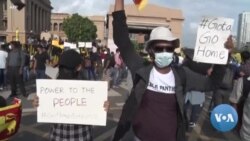China and India compete for influence in economically battered Sri Lanka.
Hello and welcome to VOA Asia Weekly. I'm Chris Casquejo in Washington. That story coming up.
But first, making headlines.
A U.S law went into effect that blocks imports from China's Xinjiang region unless businesses can prove the items were made without forced labor.
South Korea launched its first domestically built space rocket carrying what officials call a functioning "performance verification" satellite.
Bangladesh’s Prime Minister joined an aerial survey of floods that have killed dozens of people and displaced hundreds of thousands there and in neighboring India.
Major flooding has forced the evacuation of tens of thousands of people in southern China.
A hotel and casino resort in the world's biggest gambling hub of Macau was locked down by authorities with 700 people inside as the population took part in mass COVID testing.
Hong Kong’s iconic Jumbo Floating Restaurant capsized in the South China Sea less than a week after it was towed away from the city.
For a decade and a half, China’s clout in Sri Lanka grew as it built a series of infrastructure projects as part of its Belt and Road initiative. But now an economic crisis grips Sri Lanka. And India is trying to regain the influence it lost from the country that lies on its southern tip. Anjana Pasricha reports for VOA from New Delhi.
This sprawling port city set up on land reclaimed from the sea in Colombo is meant to compete with Dubai as a business hub. It is the latest of huge the Chinese-funded infrastructure projects in Sri Lanka that include a port and an airport in Hambantota.
But as an unprecedented economic crisis leaves Sri Lanka with virtually no foreign exchange reserves to buy fuel and food, or repay foreign loans, these projects are under scrutiny. Billed as economic game changers, analysts say they have yielded few returns.
“For example, the airport in Hambantota is called the emptiest airport in the world because it really is not attracting the business it should be attracting.”
Chinese loans make up about 10% of Sri Lanka’s $51 billion foreign debt. The Chinese-built infrastructure had showcased Beijing’s growing clout in the strategic country in the Indian Ocean. However, now a massive public backlash against President Gotabaya Rajapaksa and his brother Mahinda Rajapaksa, who sanctioned many of these projects, will influence future policies.
“The Rajapaksas are seen as very much tilting towards China. So, I think there is going to be a more balanced foreign policy and trying to get assistance from different and diverse actors.”
That is good news for India, for which the Chinese presence close to its southern shores had become a strategic headache.
New Delhi has committed to provide $3 billion to Colombo in loans, credit lines and credit swaps since the crisis spiraled. It has also shipped food, fuel and medical supplies to ease hardships caused by the massive shortages of essential commodities.
“The fact that India has come through in terms of addressing urgent needs, urgent humanitarian needs is very welcome by many Sri Lankans, and I speak to across the board. Many are realizing that India is a true friend.”
For New Delhi, recovering ground lost to China is a boost as it tries to counter Beijing’s growing clout in South Asia.
Anjana Pasricha for VOA News, New Delhi.
Visit our website voanews.com for the most up-to-date stories. This is VOA Asia Weekly.
Researchers say the recent discovery of a giant stingray in northern Cambodia marked the recording of the world's "biggest freshwater fish".
A team of international researchers and fishermen caught, recorded and released the stingray in the Mekong river in Cambodia on June 14. It measures 300 kilograms and 3.9 meters.
The female fish was named "Boramy" or full moon in the Khmer language because of its round shape.
It was fitted with an acoustic device that will enable biologists to monitor its behavior and track its locations.
Thanks for watching VOA Asia Weekly. I’m Chris Casquejo. See you next week.













